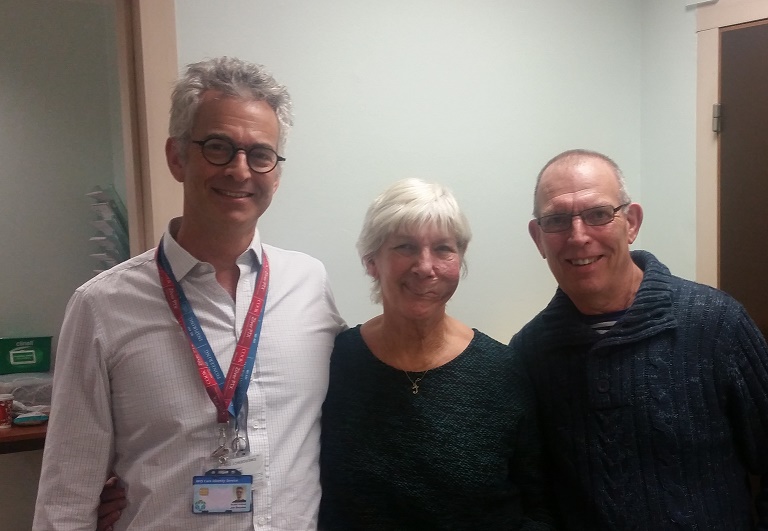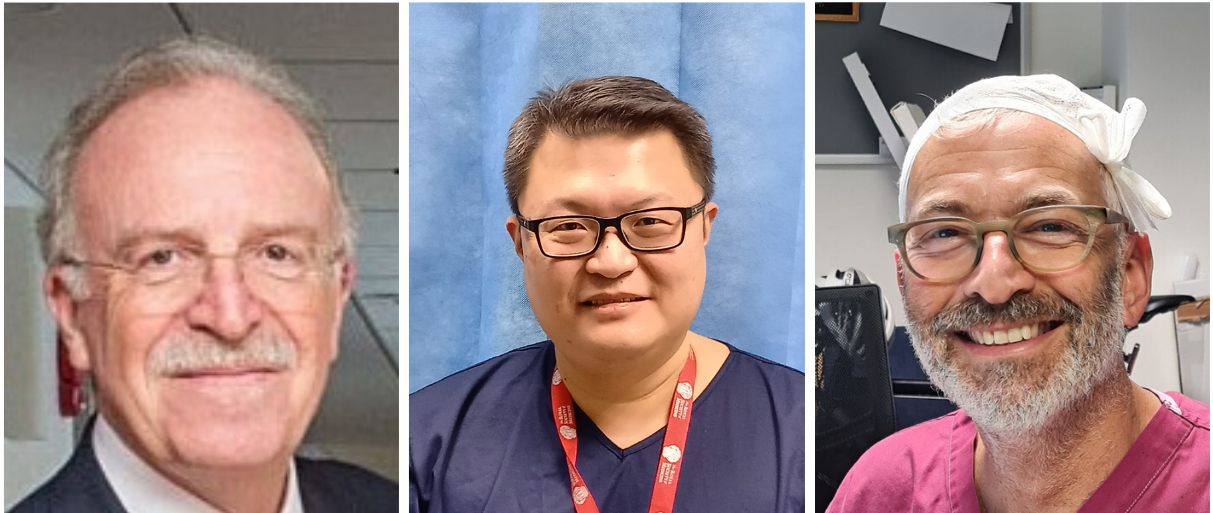
A patient receiving treatment at the Royal Free Hospital (RFH) has praised medical experts for ‘giving me back my life’.
Jeni Grantham, 69, from Okehampton, Devon, (pictured with Dr Joe Brookes and husband, Ian before mask wearing became mandatory), says she and patients like her, who suffer from a disfiguring condition, have been given new hope thanks to the life-changing treatment on offer at the RFH.
Jeni has arteriovenous malformation (AVM), a congenital genetic mutation in which blood vessels grow abnormally leading to swelling, pain and bleeding. The chronic condition tends to worsen over the years and can affect every aspect of a sufferer’s life, depending on the size and prominence of the malformation.
On top of that patients often struggle to find the right support and care they need to manage the rare and extremely challenging condition, which affects people psychologically as well as physically.
Although there is currently no cure for the condition, which can ultimately damage the function of the affected organs and may be potentially life-threatening at times, the RFH does offer effective treatment to help alleviate the worst symptoms. The vascular service runs a multidisciplinary team (MDT) composed of specialists from across the trust, which currently receives between 50 and 100 new referrals every year from all over the UK.
Patients are given embolosclerotherapy – where a radiological chemical is injected into the affected area with the aim of shrinking the vessels. Because AVM is a genetic condition, the body is programmed to keep producing the abnormal blood vessels so treatment may need to be repeated. More recently, patients are also treated with novel drug therapy targeting the biological pathways of the vascular malformation.
Jeni Grantham first developed symptoms 30 years ago and what started as a small lump in her mouth was to escalate into a dangerous and disfiguring condition. Nine years ago she started treatment at the RFH and continues to receive on-going treatment and support.
She said: “I’m so proud of the NHS and everything they have done to help me, get me a diagnosis and start me on a treatment path. For the past nine years, as things got more serious, I’ve been receiving treatment at the Royal Free Hospital and their expertise has pulled me through. For a long time I couldn’t leave the house because I was so vulnerable to extreme bleeding which is potentially life-threatening. I can’t even remember how many ambulances I’ve been in and how many operations I’ve had. Eventually you have to come to the realisation that you just have to live your life one day at a time.
“What I appreciate is that the AVM team at the Royal Free Hospital have always been completely honest with me and have never made any guarantees or promises, but they always include me in their plans and I trust them 100% to do their best for me – mentally and physically. As far as I’m concerned they have given me my life back and I’m incredibly grateful for that.”
The vascular malformation team consists of vascular surgeons Professor George Hamilton and Mr Chung Sim Lim, interventional radiologists Dr Joe Brookes (pictured below L-R), Dr Anthie Papadopoulou and Dr Mohamed Khalifa and a clinical nurse specialist, Mr Nick Evans. Sometimes surgery is also part of the treatment and plastic surgeons are part of the MDT. Some patients develop blood clots and they will be seen by a haematologist, as well as a pain consultant and patients also have access to a clinical psychologist.

The Royal Free London also runs a large collaborative translational and clinical research programme with University College London (UCL), led by Mr Chung Sim Lim, to study the biological processes that cause the condition, identify new biomarkers of the malformation, and develop new treatment and prediction tools that are tailored to the individual patient. The research is funded by the National Institute for Health Research Biomedical Research Centre, The Butterfly AVM Charity and the Royal Free Charity.
Dr Joe Brookes, senior consultant for the AVM service, said: “AVM can cause a lot of pain and misery and our job is to manage that. We explain to our patients that they now have a friend in the storm. They have often faced a lifetime of mismanagement and are frankly traumatised. We put a stop to that. We can’t deliver a cure but we can help them to manage some of the secondary affects.
“Sometimes there are periods of activity and other times there are periods of stability. If you can take a time of activity and turn it into a time of quiet stability then the condition can be managed. We are also delivering gene-based drug therapies and using thalidomide to treat AVM as it slows the process the body uses to create new blood vessels.
“We aspire to being recognised as the premier centre in the UK for people with AVM. We’ve built this clinic up since 2012 and have more experience in the field then pretty much anyone else. Four years ago we started our national educational meeting under the British Society of International Radiologists. Our vascular anomaly specialist interest group attracted 60 people around the country in the first year and the latest meeting attracted 300 people, many international.”
 Translate
Translate